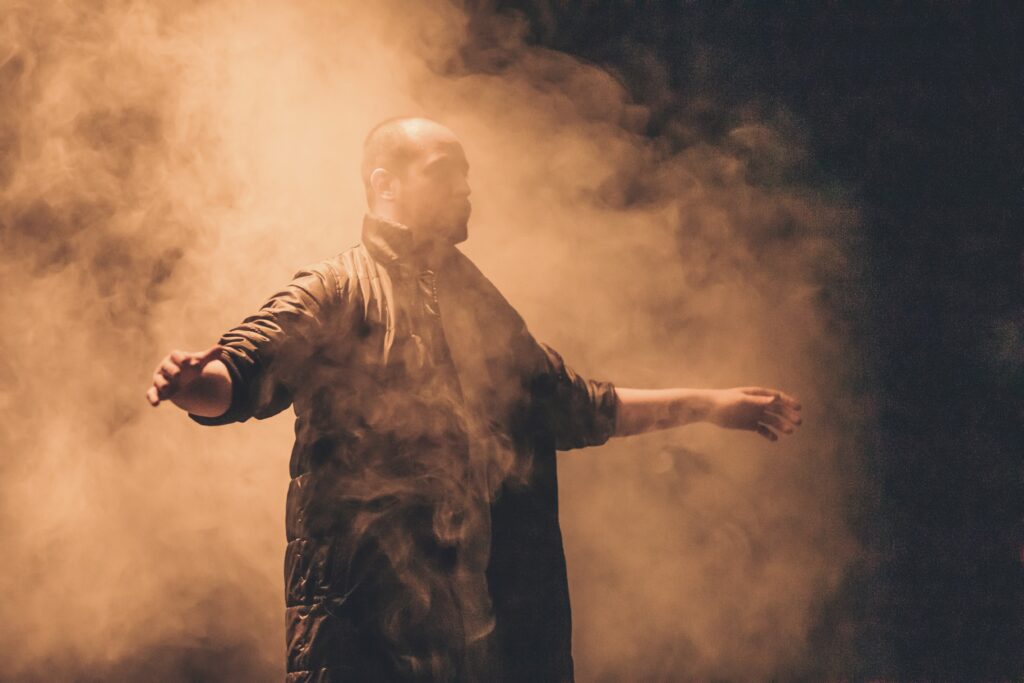POETA
The rol of Poeta from the Spanish Opera «Becqueriana», composed by Maria Rodrigo, was performed at Teatro Bauer in Madrid in 2023

ROLE INFORMATION
NAME: Becquer/ Poeta
AGE: Around 40
PROFESSION/STUDIES: Poet
FAMILY: Unknown
FRIENDS: Unknown
LOVE: The Perfect Beauty
PHYSICAL DESCRIPTION. undetermined height, undetermined size, out of good physical shape, emaciated, with visible tears under his eyes, hairless, beardless, worn-out sport suit and old overcoat.
PSYCHOLOGICAL DESCRIPTION: drug addict, psychologically disturbed, sees visions, lives in an unreal world
HOBBIES. any quick experience that brings you closer to perfect illumination and beauty. PERSONAL ITEMS: syringe, hospital bottles, lighter, teaspoon, joints
WHAT IF
What if Gustavo Adolfo Becquer had lived in our time?
What if no one would want to listen to his poetry?
What would happen to a depressed romantic like him if he realized the reality of the relationships we live in today?
What would happen if he could not make a living from his pen?
Where would he end up living?
What if no love was enough?
Rhyme XXXI
Our Passion was a tragic sainete
in whose absurd fable
the comical and the serious
confused laughter and tears.
But it was the worst of that story
that at the end of the day tears
and laughter came to her
and only tears to me.
What kind of road to perdition did I take, that seeking only love, I found only devastation?
Is it the fate of the heart to end without finding more consolation than a pinch or a liquor?
Thou who art passion ardent and pure. You who bring me the carnal virtues of the most beautiful woman. You are not the beauty I seek.
You, who are love and tenderness. You who welcome me to your bosom as a mother welcomes a child. You are not the beauty I seek.
You who are ethereal and intangible. You who run away from me every time I approach. You who whisper in my ear to leave nothing but a spirit in the air. It is you…
SYNOPSIS
«Becqueriana «
«Becqueriana» is a one-act opera composed by María Rodrigo, with a libretto by the Álvarez Quintero brothers, Serafín and Joaquín. Premiered on April 9, 1915, at Madrid’s Teatro de la Zarzuela, it holds the distinction of being the first opera by a female Spanish composer to be performed in a public theater in Spain.
The Role of the Poet:
Dramatic Function: Throughout the opera, the Poet interacts with allegorical female figures representing Passion, Tenderness, and Illusion. These interactions underscore his internal conflict and highlight the elusive nature of the love he seeks. The role demands a performer capable of portraying nuanced emotional shifts, capturing the essence of a soul in perpetual search for an idealized, intangible affection.
Character Overview: The Poet serves as the central figure in «Becqueriana.» The narrative delves into his introspective journey, depicting his quest for an ethereal and unattainable love. This theme mirrors the Romantic ideals found in Gustavo Adolfo Bécquer’s poetry, particularly his «Rima XI,» which inspired the opera’s libretto.
Vocal Characteristics: The role is written for a tenor voice, demanding a blend of lyrical expressiveness and emotional depth to convey the Poet’s longing and inner turmoil. The vocal lines are crafted with notable lyrical expansion and passion, requiring the tenor to navigate both tender and intense passages effectively.
Musical Style: Rodrigo’s composition exhibits a fusion of influences, including Wagnerian elements and Spanish musical idioms. The orchestration is rich and colorful, supporting the vocal lines with textures that enhance the emotional landscape of the Poet’s journey. The music transitions seamlessly between moments of delicate introspection and more dramatic expressions of yearning.